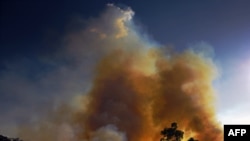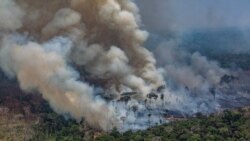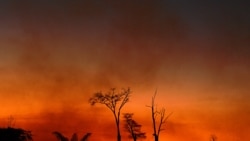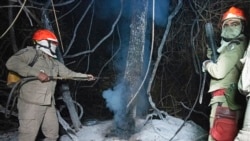On Sept. 2, the Articulation of Indigenous People of Brazil (APIB) tweeted a video about a new campaign, called “Defund Bolsonaro,” which urges investors and international corporations doing business with the country to push for the protection of the Amazon rainforest.
The video, narrated by children, starts with the question, “Can you smell the smoke? The Amazon forest is burning, again.” It closes with more questions: “Which side are you on? The Amazon or Bolsonaro?”
A week later, Brazil's vice president, Gen. Hamilton Mourao, and minister of the environment, Ricardo Salles, published a video to counter the campaign. Also narrated by a child, it began with: “Are you smelling smoke? Of course not! Because the Amazon is not burning again.”
The video goes on to say the Amazon biome is home to 1 million farmers, most from indigenous communities and small producers, with only 5 percent using fires to clear land and plant. “Therefore, these fires are cultural and of small proportion,” the narrator says.
The video also claims Brazil is the country that most preserves forests, with 66.3 percent of its native forests protected, and that only 29 percent of Brazil’s land is designated for food production: “[T]he food you consume is produced in a responsible and sustainable way. The most sustainable in the world.”
Speaking in support of the video on Sept. 9, Mourao exclaimed: "Brazil is the country that most preserves its native forests in the world. That's the truth. We take care!”
That characterization is misleading. In fact, data show that deforestation in the Amazon hit a 10-year high in 2019, and that pressure on the rainforest continues, according to researchers and first-hand accounts alike.
Nonetheless, the administration of President Jair Bolsonaro has consistently downplayed the pace of deforestation since he took office in 2019 and provided questionable statistics or assessments. For instance, as Polygraph.info noted in June, 59 percent of the Brazil’s land is forested (second only to Russia), not 66.3 percent, as the video says.
Last year, Brazil recorded the world’s biggest loss of tropical primary forests, accounting for one-third of the overall global decrease, or 1.36 million hectares, roughly the area of Connecticut – according to satellite imagery analysis for loss of tree covers conducted by the University of Maryland. Ninety-five percent of the decline happened in the Amazon rainforest.
Deforestation between August 2018 and July 2019 reached 3,800 square miles, up 30 percent compared to the same period of 2017 and 2018, according to Brazil's National Institute for Space Research (INPE).
Fires in the Amazon have continued this year.
"There aren't two sides. There is no 'the Amazon is burning' or 'the Amazon isn't burning.' There's only the side of evidence. You can have access to the fires through satellites from INPE and NASA," said Christian Braga, a Brazilian photographer and documentarian whose work has focused on the Amazon and its communities for the past eight years.
Braga documented the fires with Greenpeace in July and August. He said occurrences were up: “We flew over five states, and in August we saw illegal burning of both pasture, which was banned, in theory since July 16 … and also forest burning."
In June, the number of fires in the Amazon biome (2,248) was the highest since 2007, according to data from the Fire Program (Programa Queimadas) of INPE, which monitors fires around different Brazilian ecosystems.
Amid an increase of the spread of fires and pressure from business and investors, fires have been banned in the Amazon since July 16 for 120 days. Although outbreaks overall fell by 5 percent in August compared to a year ago, the number of fires increased by 7.8 percent in protected areas, according to Greenpeace. However, due to a technical issue in NASA's satellite tracking fires on Aug. 16, monitoring in some areas of the country are lagging behind.
In the first week of September, 8,373 fire outbreaks were already registered in the Amazon, up 13 percent from August, according to Reuters.
Most of these fires are not being started by people in traditional communities or to clear pasture by small ranchers. Rather, most are by land grabbers known as grileiros.
“Satellite data shows that the areas where the fire is taking place are not traditional communities, they are forests and newly deforested areas,” Marcio Astrini, executive secretary of the Climate Observatory, a coalition of environmental organizations, told Polygraph.info.
“Fires for cleaning pasture or grass doesn’t create these columns of fire in the Amazon," he said. "What creates these columns are environmental crimes.”
During his trip, Braga saw that many of the areas that were burning last year had become pastures, some with cattle. “It confirms that many of the fires weren’t natural. They happened illegally and purposefully,” he said.
According to a 2019 analysis by the Amazon Environmental Research Institute (IPAM), about 34 percent of fires are in newly deforested areas – the final step for squatters to take over the land. Thirty percent were forest fires – with a goal of burning forests to then occupy them or incorporate them into farms – and 36 percent were in farmlands – used for management, renewal of pasture and elimination of grass pests.
In September, 27 percent of the largest fires were in virgin forests, according to an analysis from the non-governmental organization Amazon Conservation, Reuters reported.
When it comes to sustainability in food production, Brazil is far from being “the most sustainable in the world.”
According to the Food and Agriculture Organization of the United Nations (FAO), Brazil is third-highest in pesticide use, behind only China and the United States. As for greenhouse gas, Brazil is the seventh-largest emitter, according to Climate Watch.
The Defund Bolsonaro campaign is the latest initiative by a wide range of organizations, investors and governments to urge action on deforestation of the Amazon.
At the end of July, three of the biggest private banks in Brazil jointly released an integrated plan for Amazon conservation and sustainable development. Also that month, the investment firm Nordea Asset Management dropped from its funds the Brazilian meat giant, JBS SA, over its role in deforestation, among other issues, The Wall Street Journal reported.
Brazil’s plans to participate in a trade pact between the European Union and Mercosur, the South American Free Trade Zone, was put on hold in 2019 over concerns about the Amazon.
Bolsonaro's government continues to defend its environmental protection record. In a July radio interview, Mourao said, “Rest assured enforcement continues to happen, and with good results.”
Speaking this week to journalists about the “Defund Bolsonaro” rebuttal video, he said: "Those groups that consider that we are not dealing properly with the Amazon issue do their propaganda work. We have to do the counter propaganda. This is part of the deal."








